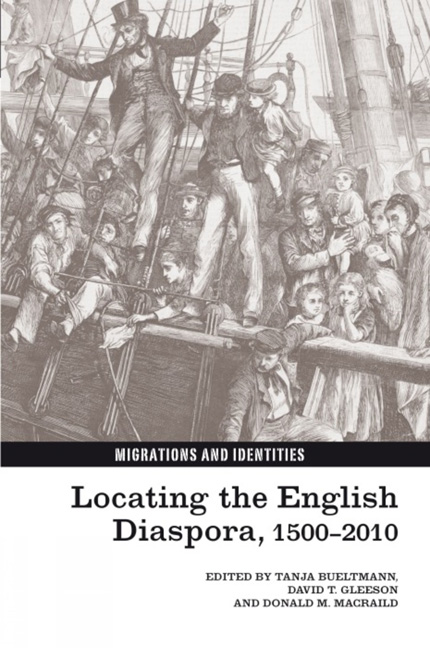Book contents
- Frontmatter
- Contents
- Notes on Contributors
- Introduction. Locating the English Diaspora: Problems, Perspectives and Approaches
- 1 Mythologies of Empire and the Earliest English Diasporas
- 2 The English Seventeenth Century in Colonial America: The Cultural Diaspora of English Republican Ideas
- 3 Fox Hunting and Anglicization in Eighteenth-Century Philadelphia
- 4 The Hidden English Diaspora in Nineteenth-Century America
- 5 An English Institution? The Colonial Church of England in the First Half of the Nineteenth Century
- 6 The Importance of Being English: English Ethnic Culture in Montreal, c.1800–1864
- 7 Anglo-Saxonism and the Racialization of the English Diaspora
- 8 ‘The Englishmen here are much disliked’: Hostility towards English Immigrants in Early Twentieth-Century Toronto
- 9 Cousin Jacks, New Chums and Ten Pound Poms: Locating New Zealand's English Diaspora
- 10 ‘Cooked in true Yorkshire fashion’: Regional Identity and English Associational Life in New Zealand before the First World War
- 11 Englishness and Cricket in South Africa during the Boer War
- 12 An Englishman in New York? Celebrating Shakespeare in America, 1916
- 13 The Disappearance of the English: Why is there no ‘English Diaspora’?
- Index
2 - The English Seventeenth Century in Colonial America: The Cultural Diaspora of English Republican Ideas
- Frontmatter
- Contents
- Notes on Contributors
- Introduction. Locating the English Diaspora: Problems, Perspectives and Approaches
- 1 Mythologies of Empire and the Earliest English Diasporas
- 2 The English Seventeenth Century in Colonial America: The Cultural Diaspora of English Republican Ideas
- 3 Fox Hunting and Anglicization in Eighteenth-Century Philadelphia
- 4 The Hidden English Diaspora in Nineteenth-Century America
- 5 An English Institution? The Colonial Church of England in the First Half of the Nineteenth Century
- 6 The Importance of Being English: English Ethnic Culture in Montreal, c.1800–1864
- 7 Anglo-Saxonism and the Racialization of the English Diaspora
- 8 ‘The Englishmen here are much disliked’: Hostility towards English Immigrants in Early Twentieth-Century Toronto
- 9 Cousin Jacks, New Chums and Ten Pound Poms: Locating New Zealand's English Diaspora
- 10 ‘Cooked in true Yorkshire fashion’: Regional Identity and English Associational Life in New Zealand before the First World War
- 11 Englishness and Cricket in South Africa during the Boer War
- 12 An Englishman in New York? Celebrating Shakespeare in America, 1916
- 13 The Disappearance of the English: Why is there no ‘English Diaspora’?
- Index
Summary
Eighteenth-century American republicanism was borne across the Atlantic from more than one European political culture. The Dutch emigrant population in New York and Pennsylvania and the French Huguenot population in South Carolina contributed significantly to the rich array of beliefs that comprised American republican thought. Indeed, the influence of such traditions makes it more appropriate to talk of plural republicanisms than of a singular political discourse. Given our concern in this volume with the English Diaspora, however, the argument that follows has two foci. In the first instance, a historiographical survey is presented demonstrating the influence of English republican writing on the political thought of colonial America from the later seventeenth century. In the second we analyse the extent to which the original settlers in New England took with them a nascent republicanism derived from their religious beliefs. The English Puritanism exported to America was shaped by a distinctively English politics, a politics that provided a fertile field from which English republicanism of the later colonial period would grow. From 1629 in particular, cultural and political discourse in colonial New England, where English settlers predominated, was shaped decisively by its presence. From the early 1600s, New England, as we shall see, provided a rich and sympathetic context in which republican ideas were received in the eighteenth century. The discussion demonstrates the extent to which the cultural diaspora of English republican ideas was embedded in the writing and actions of English immigrants to Massachusetts from the outset. Before engaging with the force of English Puritanism directly through the selected works of, among others, John Winthrop and John Cotton, the chapter examines discursively the arguments and debates surrounding the impact on, and extent to which, the ‘classics’ of English republican literature were accepted and embraced during the colonial and revolutionary periods.
- Type
- Chapter
- Information
- Locating the English Diaspora, 1500–2010 , pp. 34 - 51Publisher: Liverpool University PressPrint publication year: 2012



